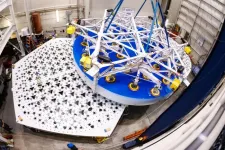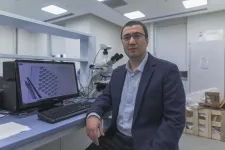(Press-News.org) TUCSON, AZ — October 15, 2024 — The Giant Magellan Telescope today announced the successful installation of one of its completed 8.4-meter-diameter primary mirrors into a support system prototype at the University of Arizona’s Richard F. Caris Mirror Lab. This highly sophisticated system — comparable in size to half a basketball court and containing three times the number of parts of a typical car — is vital to the telescope’s optical performance and precision control. The milestone marks the start of a six-month optical testing phase to demonstrate that the support system can control the mirror as required, validating the revolutionary capabilities of the telescope’s primary light-collecting surface.
The Giant Magellan’s 368-square-meter light-collecting surface is composed of seven of the world’s largest optical mirrors arranged in a unique flower pattern. Together, they will provide the highest image resolution over the widest field of view ever achieved for the exploration of the Universe — delivering up to 200 times the power of today’s best telescopes. Each primary mirror weighs 17-metric tons and is supported by a highly specialized pneumatic support system which is housed in a steel weldment, or “cell.” This system works with nanometer precision, and is designed to adjust the mirror’s position, stabilize its temperature, protect it from seismic activity, and maintain its precise shape by mitigating mirror sagging from gravity as the telescope moves. The system controls the combined seven primary mirrors to act as a single light-collecting surface, creating the optimal conditions for peak optical performance during scientific observations.
“This work is funded by a National Science Foundation award,” said Barbara Fischer, Primary Mirror Subsystem Manager for the Giant Magellan Telescope. “We began integrating the active support prototype system more than three years ago, and we first used a steel mirror mass simulator to demonstrate that our design was able to safely support and control the completed primary mirror segments. I am honored to work with an extraordinary team, and it is exciting to finally see a completed mirror segment integrated with the cell.”
As a key part of the integration process, Giant Magellan worked closely with Texas A&M University to clean, assemble, and test the support actuators that are being used in the cell. While the actual installation of the mirror into the cell took only one day, the process began with four weeks of disassembly to prepare the cell and support system for transport. The system was then moved 20 miles from the University of Arizona’s Tech Park to the Richard F. Caris Mirror Lab for reassembly. This logistically complex operation occurred a few hours after midnight to minimize traffic disruptions, as the wide-load cell required two road lanes for transport.
“The Giant Magellan Telescope’s primary mirror active support system is the first of its kind,” said Trupti Ranka, Principal Opto-Mechanical Control Systems Engineer for the Giant Magellan Telescope. “The active support system contains an array of approximately 200 actuators and sensors to control the position and shape of the 17-metric tons, 8.4-meter mirror within a fraction of a micron. The control system allows a harmonious operation between the sensor data and actuators to achieve this precision.”
Now that one of the primary mirrors has been successfully integrated with the support system prototype, it will undergo rigorous testing under a metrology tower at the Richard F. Caris Mirror Lab to confirm that the mirror can maintain its shape and performance under various operational conditions. Once testing is complete, the design for the production active support systems will undergo a final design review, and production will commence in 2027.
“This intricate system took years of designing, building, and testing by a team of specialized engineers and technicians,” said Tomas Krasuski, Principal Software and System Test Engineer for the Giant Magellan Telescope. “Every single component was thoroughly tested before integrating it into the system. Now that we’ve installed the mirror segment, we are excited to validate its performance. It has been a challenging yet rewarding process to get here.”
The milestone highlights the next stage of advancement for the Giant Magellan Telescope’s seven primary mirror segments and their support systems. Three of the primary mirror segments are complete, while the remaining four are in various stages of polishing. The seventh and final primary mirror was cast in October 2023 and is now being prepared for polishing. This latest milestone also follows the August 2024 start of the Giant Magellan’s 39-meter-tall telescope mount structure assembly at Ingersoll Machine Tools in Rockford, Illinois, which will support the seven primary mirrors and their cells, adaptive optics, and scientific instruments.
“For the first time, a completed primary mirror segment has been integrated into its support system — this is a giant step in our journey toward first light,” said William Burgett, Project Manager for the Giant Magellan Telescope. “Once its performance is validated, we will begin manufacturing all seven mirror cells at Ingersoll Machine Tools, which will be one of the most exciting advancements to date.”
The Giant Magellan Telescope is now 40% under construction across 36 states and on track to be operational in Chile by the early 2030s.
END
Giant Magellan telescope begins primary mirror support system testing
World’s largest optical mirror successfully installed on support system prototype for the first time to validate telescope’s extraordinary performance
2024-10-15
ELSE PRESS RELEASES FROM THIS DATE:
Experimental cancer drug eliminates bone metastases caused by breast cancer in lab models
2024-10-15
In a new study led by Johns Hopkins Medicine, the drug RK-33 has demonstrated promise in treating breast cancer that has spread to the bone (breast cancer bone metastasis). RK-33 was previously shown to help treat other types of cancer and viral illnesses.
Patients with breast cancer and bone metastasis have limited treatment options and often rely on palliative care to ease difficult symptoms, including frailty and pain. In most cases, breast cancer with bone metastasis is incurable.
Now, corresponding author Venu Raman, Ph.D., ...
Political candidates who fight climate change stand to benefit in election
2024-10-15
A majority of Floridians expressed support for political candidates who fight climate change in a new Florida Atlantic University survey. The survey found that nearly 52% of respondents agreed that a candidate with a record of reducing climate impacts was more likely to get their vote.
The Invading Sea’s Florida Climate Survey also revealed strong support in the state for increasing renewable energy use and teaching climate science in K-12 classrooms. The survey is the 11th conducted by the FAU Center for Environmental Studies ...
Stand up to Cancer announces new grants supporting pioneering research in six cancer types
2024-10-15
LOS ANGELES – Oct. 15, 2024 – Stand Up To Cancer® (SU2C) today announced grants to several teams of leading cancer investigators in support of cutting-edge research in a variety of cancers including head and neck, pediatric, pancreatic, breast, rectal and gastro-esophageal cancers, as well as research focused on how the microbiome communicates with the immune system.
“These new grants emphasize SU2C’s support of collaborative, trailblazing research that pushes the field forward and helps people impacted by some of the most common or difficult-to-treat cancers,” said Julian Adams, Ph.D., president and CEO of SU2C. “With an emphasis on answering ...
Researchers awarded $1.3M to help military Veterans battling Acute Myeloid Leukemia
2024-10-15
CLEVELAND—With a new four-year, $1.3 million grant from the U.S. Department of Veterans Affairs, researchers at Case Western Reserve University are investigating a new approach to treat Acute Myeloid Leukemia (AML) in military Veterans.
AML is the most common form of blood cancer in adults, and many patients suffer relapses—especially Veterans, due to exposure to harmful chemicals and radiation during active duty, according to the National Center for Biotechnology Information.
There is no effective treatment for AML and, according to the National Institutes of Health, half of treated patients suffer a relapse after therapy—mainly ...
New hub for high-energy astrophysics — CTAO Science Data Management Centre opens at DESY in Zeuthen
2024-10-15
Zeuthen, Germany – On 14 October 2024, the Cherenkov Telescope Array Observatory (CTAO), along with hosting partners and shareholders Deutsches Elektronen-Synchrotron DESY, celebrated the official inauguration of the Science Data Management Centre (SDMC) on the DESY campus in Zeuthen, Germany.
The ceremony, chaired by Prof. Christian Stegmann, Head of DESY Zeuthen, was opened by Mario Brandenburg, Parliamentary State Secretary at the German Federal Ministry of Education and Research (BMBF), and Tobias Dünow, State Secretary at ...
JMIR publications CEO and Executive Editor Gunther Eysenbach achieves #1 ranking as most cited researcher in Medical Informatics for fifth consecutive year
2024-10-15
Toronto, ON (October 14, 2024) – JMIR Publications is proud to announce that Gunther Eysenbach, founder, CEO and executive editor, has once again been named the #1 most cited researcher in the subfield of medical informatics by Stanford/Elsevier’s Top 2% Scientists rankings. This marks the fifth consecutive year that Dr Eysenbach has secured this prestigious position, reaffirming his status as a leading authority and driving force in the field. He is also ranked #36 in the Top 100 Scientists in Information & Communication ...
ERC grant for groundbreaking wearable health tech
2024-10-15
Dr. Levent Beker from the Department of Mechanical Engineering at Koç University, once again received European Research Council (ERC) support for his scientific research that focuses on improving the quality of our daily lives.
His previous project on an implant that can detect signs of heart failure and degrade in the body without surgery was granted €2.5 million Starting Grant from the ERC. Last year, his research on a wireless micro sensor that enables real-time monitoring of food spoilage at supermarkets, was published in Nature FoodMagazine.
Currently leading the Bio-integrated ...
NIH announces winners of prize competition to improve postpartum maternal health and health equity through innovative diagnostics
2024-10-15
The National Institutes of Health (NIH) has announced the winners of the Rapid Acceleration of Diagnostics Technology (RADx® Tech) for Maternal Health Challenge, an $8 million prize competition to encourage development of postpartum maternal health diagnostics for use in regions that have limited access to maternity care. The eight winning teams developed home-based and point-of-care diagnostics, wearables and other accessible technologies to improve postpartum health outcomes during the period when most maternal deaths occur—up to one year after delivery or the end of ...
APS and SPR honor Dr. Cynthia F. Bearer with the 2025 Mary Ellen Avery Neonatal Research Award
2024-10-15
October 15, 2024 – The American Pediatric Society (APS) and the Society for Pediatric Research (SPR) are pleased to announce Cynthia F. Bearer, MD, PhD, as the 2025 Mary Ellen Avery Neonatal Research Award recipient. This award honors a pediatric investigator who has made important contributions to neonatal health through basic or translational research.
Dr. Bearer is the William & Lois Briggs Chair of Neonatology and Chief, Division of Neonatology, Rainbow Babies & Children’s Hospital and Professor of Pediatrics & Neurosciences at Case Western Reserve University. ...
Election delays and voter trust
2024-10-15
A pre-registered survey of nearly 10,000 Americans shows that delays in declaring the winners of elections cause distrust in the electoral process, but that reassuring voters before polls close that delays are normal can prevent this distrust from taking root. National elections in the United States were not definitively settled for days after election day in 2020 and 2022. There are legitimate reasons for such delays, including state rules about when counting can commence and laws about whether mailed ballots postmarked on election day must be counted. However, delayed results ...
LAST 30 PRESS RELEASES:
Scientists reveal our best- and worst-case scenarios for a warming Antarctica
Cleaner fish show intelligence typical of mammals
AABNet and partners launch landmark guide on the conservation of African livestock genetic resources and sustainable breeding strategies
Produce hydrogen and oxygen simultaneously from a single atom! Achieve carbon neutrality with an 'All-in-one' single-atom water electrolysis catalyst
Sleep loss linked to higher atrial fibrillation risk in working-age adults
Visible light-driven deracemization of α-aryl ketones synergistically catalyzed by thiophenols and chiral phosphoric acid
Most AI bots lack basic safety disclosures, study finds
How competitive gaming on discord fosters social connections
CU Anschutz School of Medicine receives best ranking in NIH funding in 20 years
Mayo Clinic opens patient information office in Cayman Islands
Phonon lasers unlock ultrabroadband acoustic frequency combs
Babies with an increased likelihood of autism may struggle to settle into deep, restorative sleep, according to a new study from the University of East Anglia.
National Reactor Innovation Center opens Molten Salt Thermophysical Examination Capability at INL
International Progressive MS Alliance awards €6.9 million to three studies researching therapies to address common symptoms of progressive MS
Can your soil’s color predict its health?
Biochar nanomaterials could transform medicine, energy, and climate solutions
Turning waste into power: scientists convert discarded phone batteries and industrial lignin into high-performance sodium battery materials
PhD student maps mysterious upper atmosphere of Uranus for the first time
Idaho National Laboratory to accelerate nuclear energy deployment with NVIDIA AI through the Genesis Mission
Blood test could help guide treatment decisions in germ cell tumors
New ‘scimitar-crested’ Spinosaurus species discovered in the central Sahara
“Cyborg” pancreatic organoids can monitor the maturation of islet cells
Technique to extract concepts from AI models can help steer and monitor model outputs
Study clarifies the cancer genome in domestic cats
Crested Spinosaurus fossil was aquatic, but lived 1,000 kilometers from the Tethys Sea
MULTI-evolve: Rapid evolution of complex multi-mutant proteins
A new method to steer AI output uncovers vulnerabilities and potential improvements
Why some objects in space look like snowmen
Flickering glacial climate may have shaped early human evolution
First AHA/ACC acute pulmonary embolism guideline: prompt diagnosis and treatment are key
[Press-News.org] Giant Magellan telescope begins primary mirror support system testingWorld’s largest optical mirror successfully installed on support system prototype for the first time to validate telescope’s extraordinary performance








